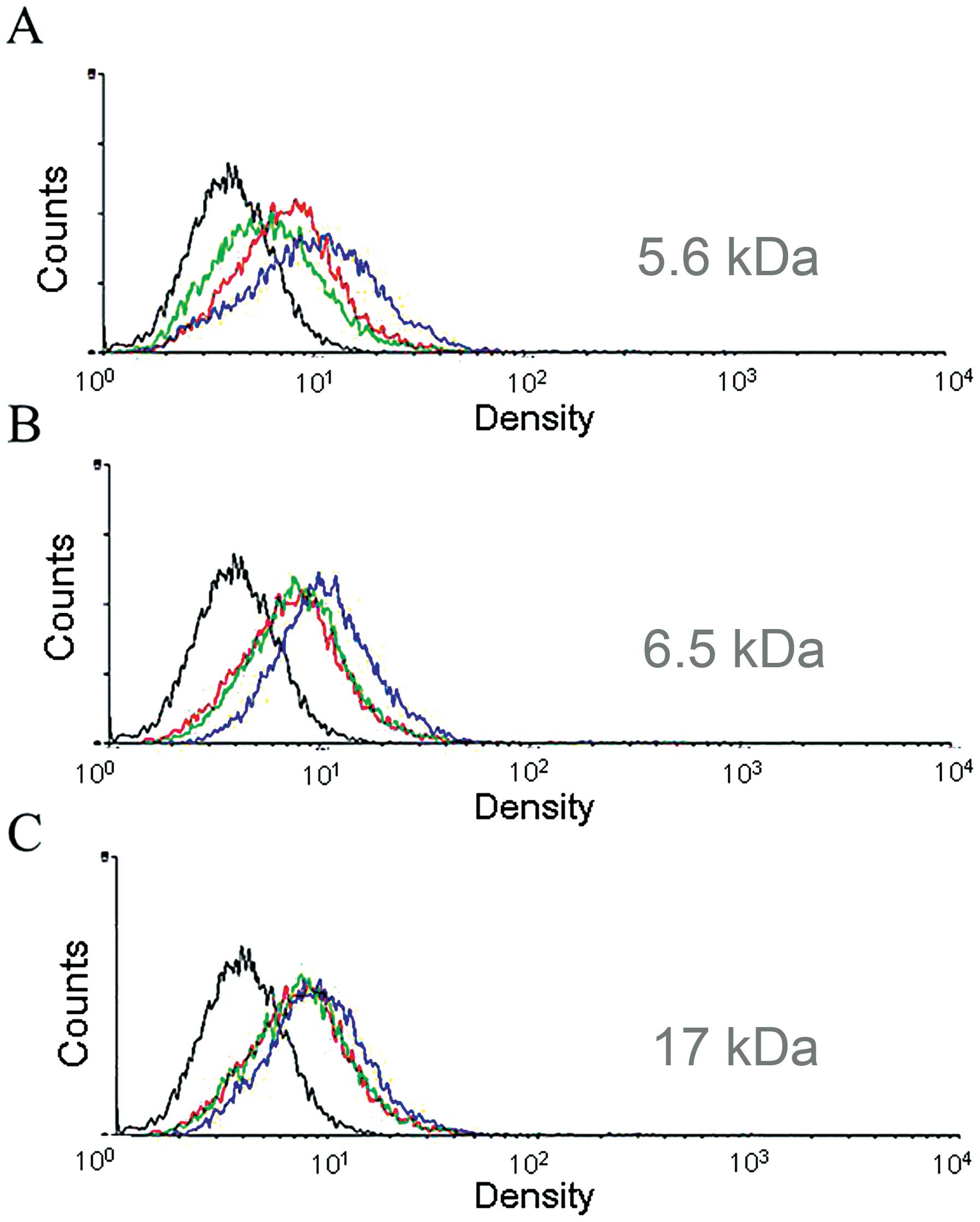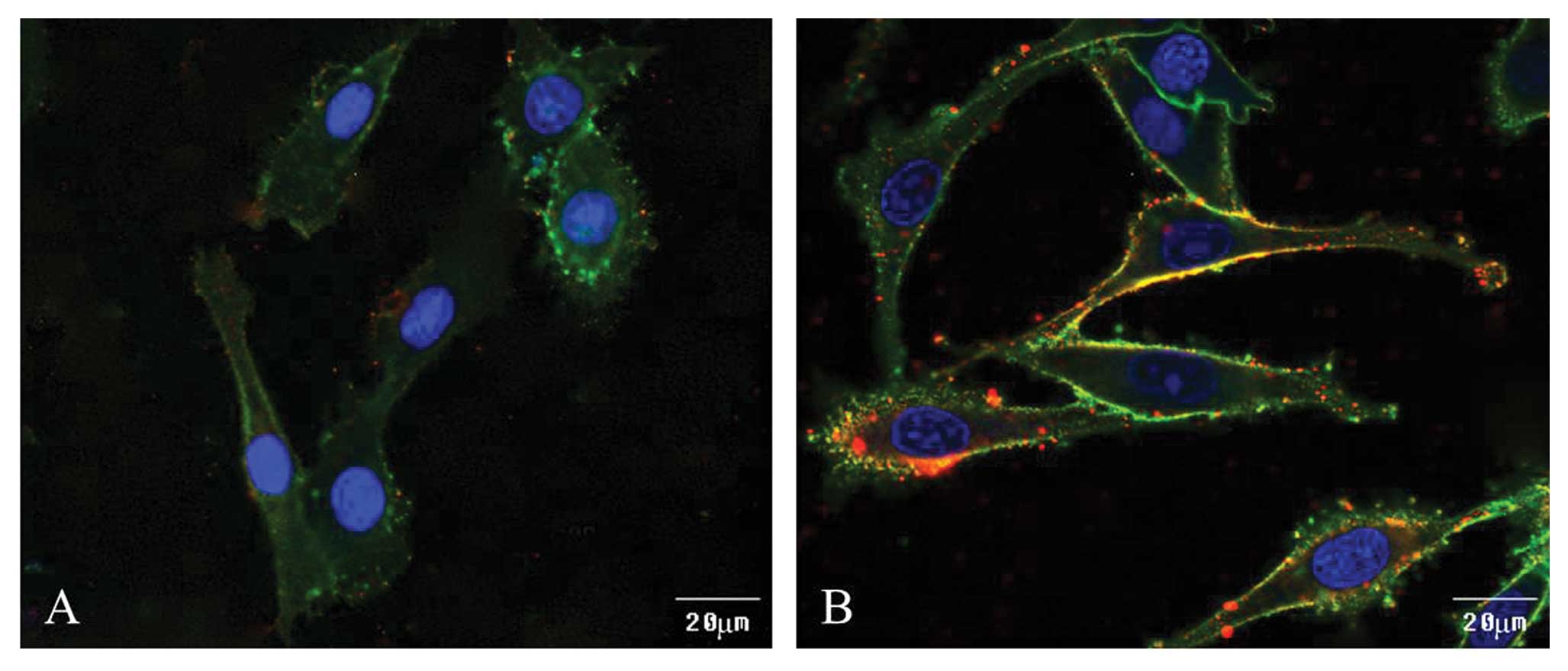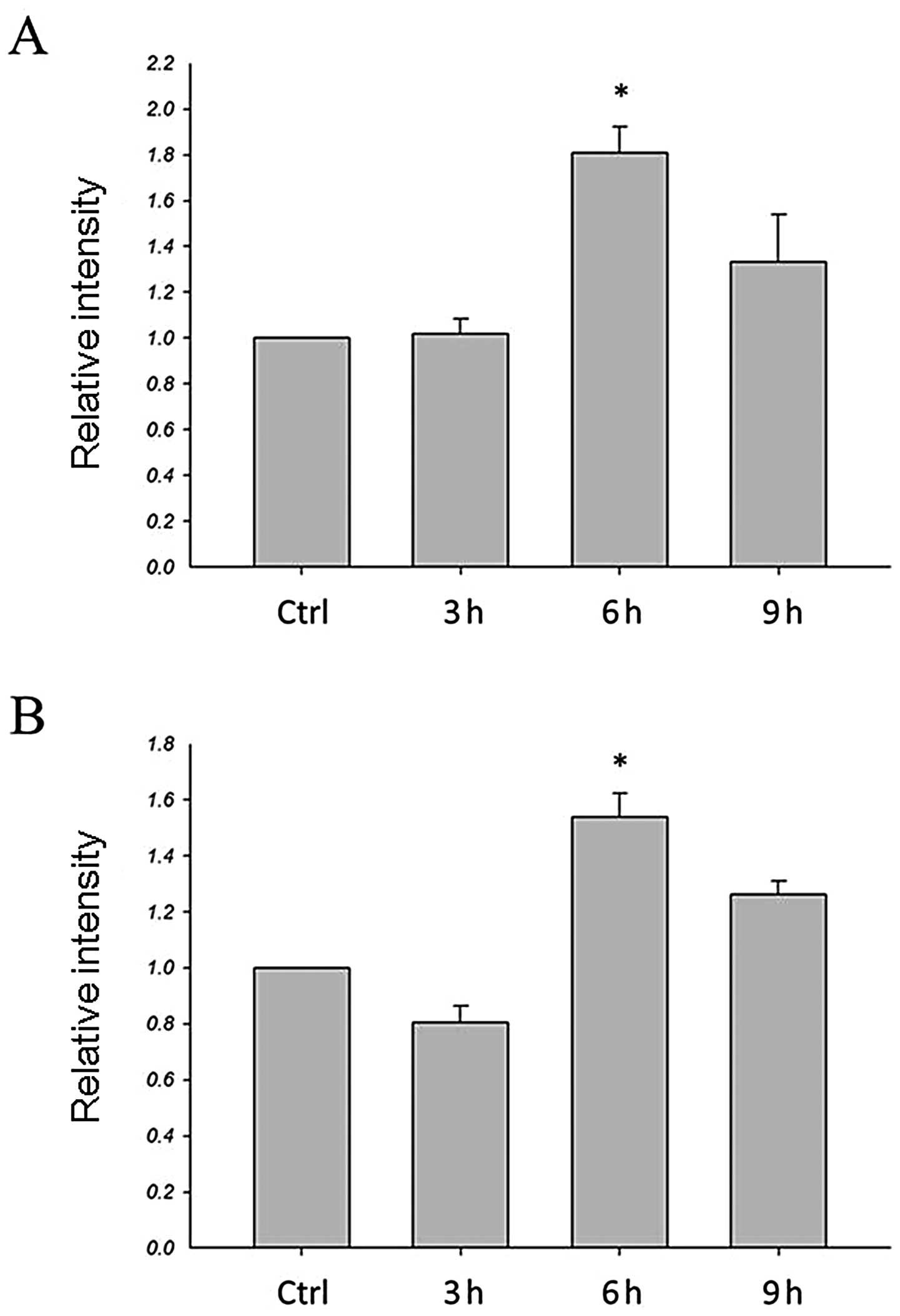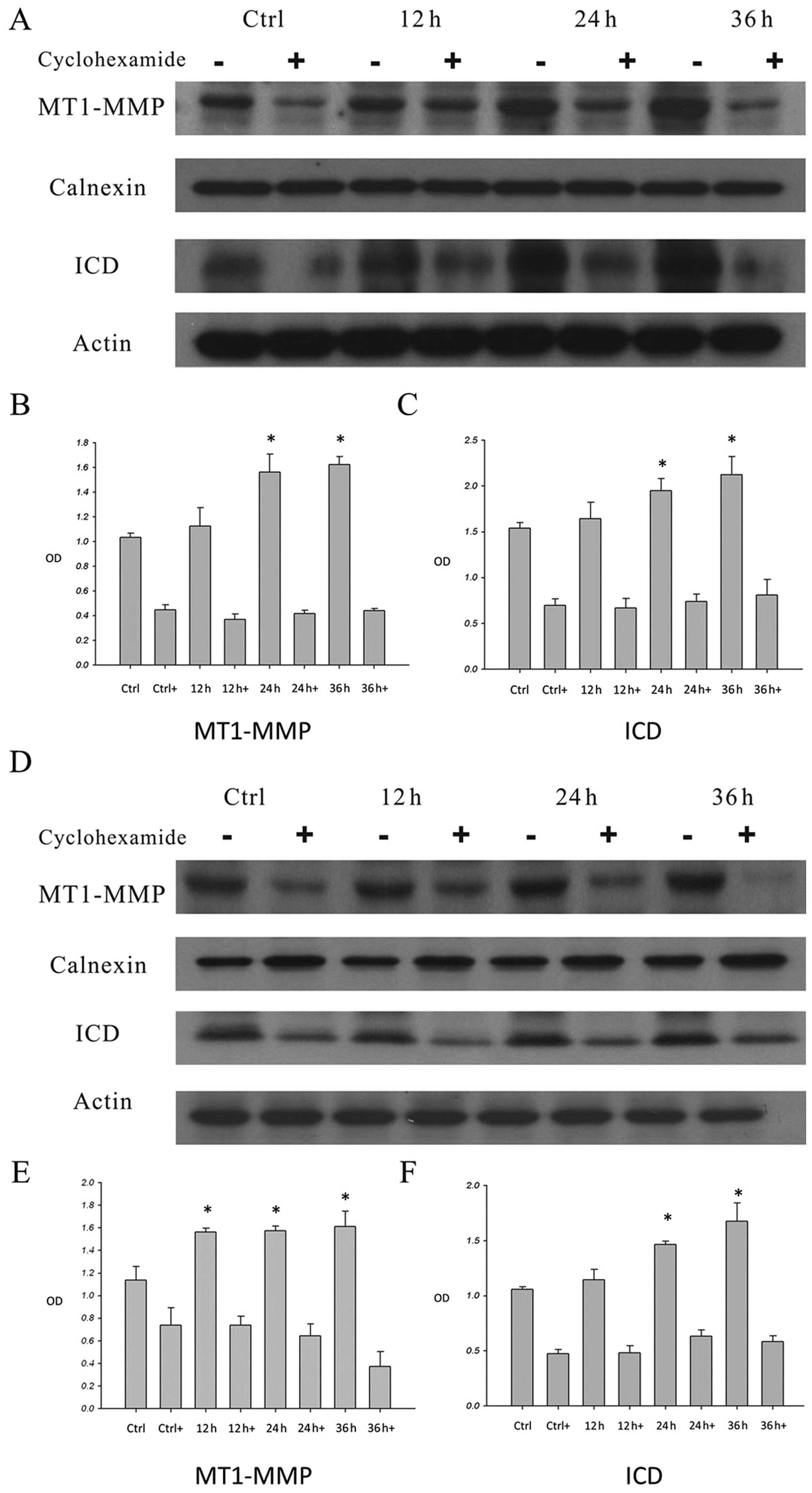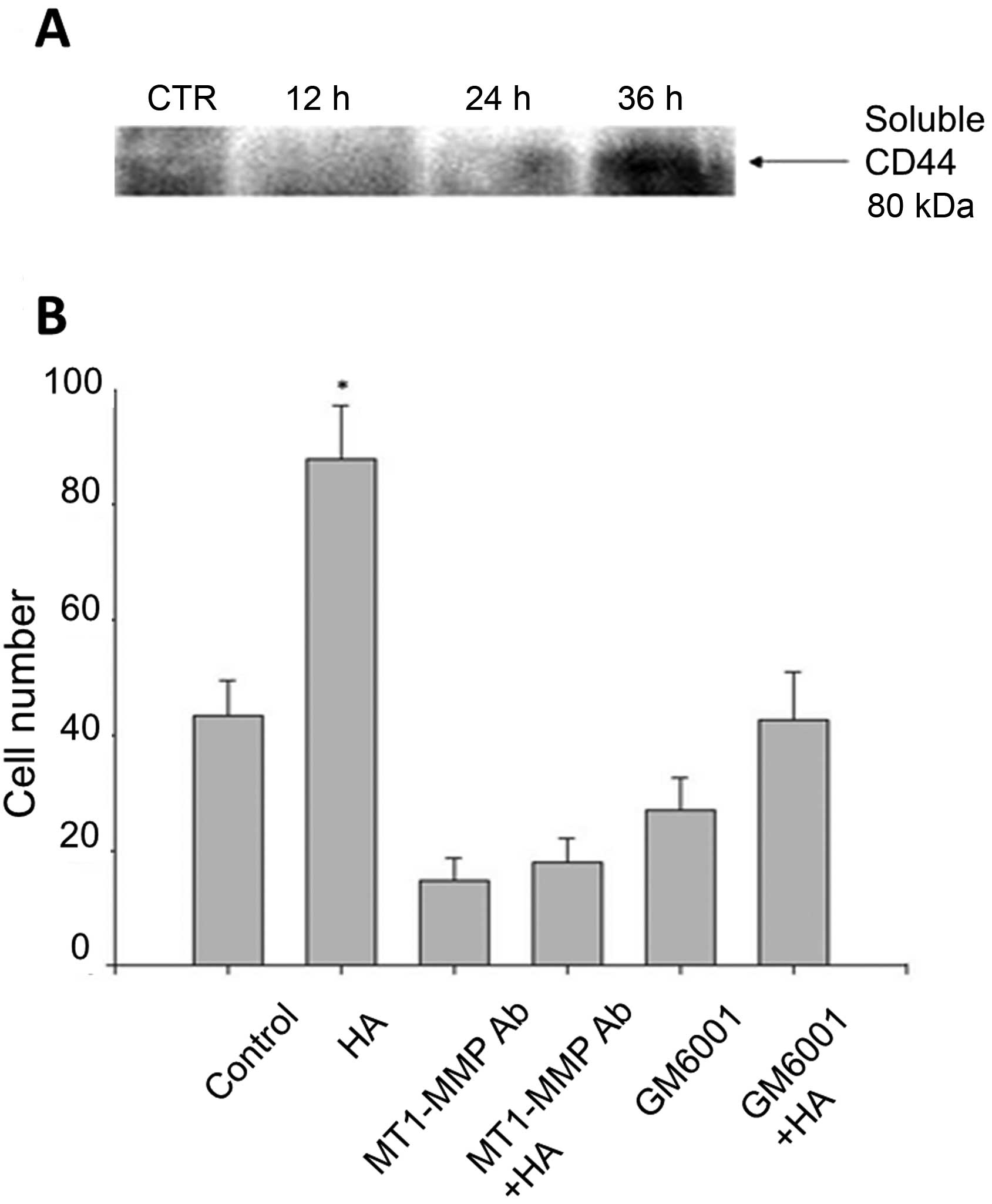|
1
|
Lesley L, Hyman R and Kincade PW: CD44 and
its interaction with extracellular matrix. Adv Immunol. 54:271–335.
1993. View Article : Google Scholar : PubMed/NCBI
|
|
2
|
Naor D, Sionov RV and Ish-Shalom D: CD44:
structure, function, and association with the malignant process.
Adv Cancer Res. 71:241–319. 1997. View Article : Google Scholar : PubMed/NCBI
|
|
3
|
Shimizu Y, Van Seventer GA, Siraganian R,
et al: Dual role of the CD44 molecule in T cell adhesion and
activation. J Immunol. 143:2457–2463. 1989.PubMed/NCBI
|
|
4
|
Gunthert U, Hofmann M, Rudy W, et al: A
new variant of glycoprotein CD44 confers metastatic potential to
rat carcinoma cells. Cell. 65:13–24. 1991. View Article : Google Scholar : PubMed/NCBI
|
|
5
|
Screaton GR, Bell MV, Jackson DG, et al:
Genomic structure of DNA encoding the lymphocyte homing receptor
CD44 reveals at least 12 alternatively spliced exons. Proc Natl
Acad Sci USA. 89:12160–12164. 1992. View Article : Google Scholar : PubMed/NCBI
|
|
6
|
Underhill CB: CD44: the hyaluronan
receptor. J Cell Sci. 103:293–298. 1992.
|
|
7
|
Liotta LA: Tumor invasion and metastases -
role of the extracellular matrix: Rhoads Memorial Award Lecture.
Cancer Res. 46:1–7. 1986.PubMed/NCBI
|
|
8
|
Guo UJ, Ma J, Wang J, et al: Inhibition of
human melanoma growth and metastasis in vivo by anti-CD44
monoclonal antibody. Cancer Res. 54:1561–1565. 1994.PubMed/NCBI
|
|
9
|
Zahalka MA, Okon E, Gosslar U, et al:
Lymph node (but not spleen) invasion by murine lymphoma is both
CD44- and hyaluronate-dependent. J Immunol. 154:5345–5355.
1995.PubMed/NCBI
|
|
10
|
Okamoto I, Kawano Y, Tsuiki H, et al: CD44
cleavage induced by a membrane-associated metalloprotease plays a
critical role in tumor cell migration. Oncogene. 18:1435–1446.
1999. View Article : Google Scholar : PubMed/NCBI
|
|
11
|
Zhong J, Cornelsen Gencay MM, Bubendorf L,
et al: ERK1/2 and p38 MAP kinase control MMP-2, MT1-MMP, and TIMP
action and affect cell migration: a comparison between mesothelioma
and mesothelial cells. J Cell Physiol. 207:540–552. 2006.
View Article : Google Scholar : PubMed/NCBI
|
|
12
|
Okamoto I, Kawano Y, Murakami D, et al:
Proteolytic release of CD44 intracellular domain and its role in
the CD44 signaling pathway. J Cell Biol. 155:755–762. 2001.
View Article : Google Scholar : PubMed/NCBI
|
|
13
|
Mignatti P and Rifkin DB: Biology and
biochemistry of proteinases in tumor invasion. Physiol Rev.
73:161–195. 1993.PubMed/NCBI
|
|
14
|
Nagase H and Woessner JF Jr: Matrix
metalloproteinases. J Biol Chem. 274:21491–21494. 1999. View Article : Google Scholar
|
|
15
|
Seiki M: Membrane-type matrix
metalloproteinases. APMIS. 107:137–143. 1999. View Article : Google Scholar
|
|
16
|
Hiraoka N, Allen E, Apel IJ, et al: Matrix
metalloproteinases regulate neovascularization by acting as
pericellular fibrinolysins. Cell. 95:365–377. 1998. View Article : Google Scholar : PubMed/NCBI
|
|
17
|
Galvez BG, Matias-Roman S, Albar JP, et
al: Membrane type 1-matrix metalloproteinase is activated during
migration of human endothelial cells and modulates endothelial
motility and matrix remodeling. J Biol Chem. 276:37491–37500. 2001.
View Article : Google Scholar
|
|
18
|
Egeblad M and Werb Z: New functions for
the matrix metalloproteinases in cancer progression. Nat Rev
Cancer. 2:161–174. 2002. View
Article : Google Scholar : PubMed/NCBI
|
|
19
|
Sato H, Takino T, Okada Y, et al: A matrix
metalloproteinase expressed on the surface of invasive tumour
cells. Nature. 370:61–65. 1994. View
Article : Google Scholar : PubMed/NCBI
|
|
20
|
Knauper V, Will H, Lopez-Otin C, et al:
Cellular mechanisms for human procollagenase-3 (MMP-13) activation.
Evidence that MT1-MMP (MMP-14) and gelatinase a (MMP-2) are able to
generate active enzyme. J Biol Chem. 271:17124–17131. 1996.
View Article : Google Scholar : PubMed/NCBI
|
|
21
|
Kuo YC, Su CH, Liu CY, et al: Transforming
growth factor-beta induces CD44 cleavage that promotes migration of
MDA-MB-435s cells through the up-regulation of membrane type
1-matrix metalloproteinase. Int J Cancer. 124:2568–2576. 2009.
View Article : Google Scholar : PubMed/NCBI
|
|
22
|
Seiki M: The cell surface: the stage for
matrix metalloproteinase regulation of migration. Curr Opin Cell
Biol. 14:624–632. 2002. View Article : Google Scholar : PubMed/NCBI
|
|
23
|
Okada Y: Tumor cell-matrix interaction:
pericellular matrix degradation and metastasis. Verh Dtsch Ges
Pathol. 84:33–42. 2000.PubMed/NCBI
|
|
24
|
Laurent TC and Graser JR: Hyaluronan.
FASEB J. 6:2397–2404. 1992.PubMed/NCBI
|
|
25
|
Balazs EA, Watson D, Duff IF, et al:
Hyaluronic acid in synovial fluid. I Molecular parameters of
hyaluronic acid in normal and arthritis human fluids. Arthritis
Rheum. 10:357–376. 1967. View Article : Google Scholar : PubMed/NCBI
|
|
26
|
Dahl IM and Laurent TC: Concentration of
hyaluronan in the serum of untreated cancer patients with special
reference to patients with mesothelioma. Cancer. 62:326–330. 1988.
View Article : Google Scholar : PubMed/NCBI
|
|
27
|
Kumar S, West DC, Ponting JM, et al: Sera
of children with renal tumours contain low-molecular-mass
hyaluronic acid. Int J Cancer. 44:445–448. 1989. View Article : Google Scholar : PubMed/NCBI
|
|
28
|
Lokeshwar VB, Obek C, Soloway MS, et al:
Tumor-associated hyaluronic acid: a new sensitive and specific
urine marker for bladder cancer. Cancer Res. 57:773–777.
1997.PubMed/NCBI
|
|
29
|
West DC, Hampson IN, Arnold F, et al: The
effect of hyaluronate and its oligosaccharides on endothelial cell
proliferation and monolayer integrity. Science. 228:1324–1326.
1985.
|
|
30
|
Lokeshwar VB, Rubinowicz D, Schroeder GL,
et al: Stromal and epithelial expression of tumor markers
hyaluronic acid and HYAL1 hyaluronidase in prostate cancer. J Biol
Chem. 276:11922–11932. 2001. View Article : Google Scholar : PubMed/NCBI
|
|
31
|
Pham JT, Blick NL and Lokeshwar VB:
Tumor-derived hyaluronidase: a diagnostic urine marker for
high-grade bladder cancer. Cancer Res. 57:778–783. 1997.PubMed/NCBI
|
|
32
|
Itano N, Atsumi F, Sawai T, et al:
Abnormal accumulation of hyaluronan matrix diminishes contact
inhibition of cell growth and promotes cell migration. Proc Natl
Acad Sci USA. 99:3609–3614. 2002. View Article : Google Scholar : PubMed/NCBI
|
|
33
|
Sohara Y, Ishiguro N, Machida K, et al:
Hyaluronan activates cell motility of v-Src-transformed cells via
Ras-mitogen-activated protein kinase and phosphoinositide
3-kinase-Akt in a tumor-specific manner. Mol Biol Cell.
12:1850–1868. 2001. View Article : Google Scholar : PubMed/NCBI
|
|
34
|
Sneath RJ and Mangham DC: The normal
structure and function of CD44 and its role in neoplasia. Mol
Pathol. 51:191–200. 1998. View Article : Google Scholar : PubMed/NCBI
|
|
35
|
Kajita M, Itoh Y, Chiba T, et al:
Membrane-type 1 matrix metalloproteinase cleaves CD44 and promotes
cell migration. J Cell Biol. 153:893–904. 2001. View Article : Google Scholar : PubMed/NCBI
|
|
36
|
Mori H, Tomari T, Koshikawa N, et al: CD44
directs membrane-type 1 matrix metalloproteinase to lamellipodia by
associating with its hemopexin-like domain. EMBO J. 21:3949–3959.
2002. View Article : Google Scholar : PubMed/NCBI
|
|
37
|
Ueda J, Kajita M, Suenaga N, et al:
Sequence-specific silencing of MT1-MMP expression suppresses tumor
cell migration and invasion: importance of MT1-MMP as a therapeutic
target for invasive tumors. Oncogene. 22:8716–8722. 2003.
View Article : Google Scholar : PubMed/NCBI
|
|
38
|
Annabi B, Bouzeghrane M, Moumdjian R, et
al: Probing the infiltrating character of brain tumors: inhibition
of RhoA/ROK-mediated CD44 cell surface shedding from glioma cells
by the green tea catechin EGCg. J Neurochem. 94:906–916. 2005.
View Article : Google Scholar : PubMed/NCBI
|
|
39
|
Goebeler M, Kaufmann D, Brocker EB, et al:
Migration of highly aggressive melanoma cells on hyaluronic acid is
associated with functional changes, increased turnover and shedding
of CD44 receptors. J Cell Sci. 109:1957–1964. 1996.PubMed/NCBI
|
|
40
|
Hotary K, Allen E, Punturieri A, et al:
Regulation of cell invasion and morphogenesis in a
three-dimensional type I collagen matrix by membrane-type matrix
metalloproteinases 1, 2, and 3. J Cell Biol. 149:1309–1323. 2000.
View Article : Google Scholar : PubMed/NCBI
|
|
41
|
Iida N and Bourguignon LY: New CD44 splice
variants associated with human breast cancers. J Cell Physiol.
162:127–133. 1995. View Article : Google Scholar : PubMed/NCBI
|















